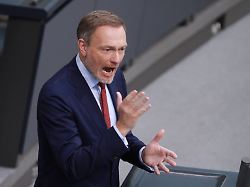One month after the turn of the year, the traffic light coalition is finally putting together the budget package for the current year. In doing so, it is picking up the pieces following the Federal Constitutional Court’s budget ruling. But the next budget is already casting dark shadows ahead.
At the end of this week, some people in the traffic light coalition will probably tick three boxes. On Friday, the Bundestag will finally approve the budget for the current year, which hangs like a deep shadow over Berlin’s government district. But until then, the coalition members first have to get through the budget week, in which all items are discussed individually.
Today, among others, it is the turn of the Federal Minister of Finance, and the Union is using the opportunity to blow Christian Lindner’s budget planning into his head. The budget is piecemeal, the government always only knows one answer: “Always new debts,” says CDU budget politician Mathias Middelberg. The government responded to the Federal Constitutional Court’s ruling with tax increases: plastic tax, agricultural diesel and VAT in the catering industry.
If one million citizens’ benefit recipients were put into work, one could save 30 billion euros every year, according to Middelberg. Lindner himself apparently also sees potential here: he has just called for the “job turbo” that was previously only intended for Ukrainians to be extended to all recipients of citizens’ benefit.
One or the other is left out
As expected, the finance minister and FDP leader rejects pretty much everything Middelberg says and paints a completely different picture of the budget. This is a creative budget, not an austerity budget. Investments are being made at record levels, the debt ratio is falling and the burden is also being relieved – with 15 billion euros in wage and income tax. Companies would be relieved of electricity tax, “from large businesses to artisan bakeries”. There would also be 20 billion euros for the Starting Opportunities program, which is intended to help schools with problems. He ignores the fact that these 20 billion should be spread over ten years.
Middelberg also leaves out some information in his scolding that would have put the facts into perspective. He denounces the shutdown of the remaining three nuclear power plants and claims that this will lead to rising energy prices. However, what is not true: According to the Federal Network Agency, wholesale prices did not rise at allsince the reactors went offline on April 15, 2023. They even sank slightly.
With regard to the heating law, Middelberg says that first there was a “completely messed up” bill, then a month-long debate that, above all, caused uncertainty to spread. Some traffic light coalition members would certainly agree with him more or less grudgingly. In fact, the uncertainty led to a boom in gas heating, which was the opposite of what the government wanted. Specifically regarding the budget, Middelberg criticizes the fact that recipients of citizens’ benefit would have their heating bills completely replaced. “Those who are still working will be taken advantage of!”
He then accuses the government of failing to reduce bureaucracy because too many new civil servants were hired in ministries. FDP householder Otto Fricke and Finance Minister Lindner oppose this. Fricke calculates to Middelberg how many civil servants were hired in 16 years of the CDU-led federal government. Lindner says that the federal police, customs and the Federal Office for Migration and Refugees will be increased so that procedures run faster. Middelberg criticizes the record number of parliamentary state secretaries and federal government representatives, for example for anti-Semitism or the Bundeswehr. In Angela Merkel’s last government, however, there were only slightly fewer.
General debate on Wednesday
The exchange of blows between the government and opposition was the prelude to the general debate on Wednesday. Then Chancellor Olaf Scholz and CDU leader Friedrich Merz will also speak, not just about the budget, but also about other topics.
What Lindner presented today is the budget from which he, together with Scholz and Economics Minister Robert Habeck, squeezed 17 billion euros out of it in an expedited process. That’s how big the budget hole was that the Federal Constitutional Court created on November 15 last year with its ruling on previous budget practice. In particular, it was forbidden to take on debt as reserves. In concrete terms, this meant that Corona billions that had been reallocated for climate protection were simply canceled, almost pulling the ground out from under the traffic light coalition’s feet. Instead of starting the new year in a relaxed manner, she had to face the farmers’ protests.
All of this should now disappear in the rearview mirror as quickly as possible. However, it is not to be expected that there will be sunshine again any time soon. Big holes are opening up again in the next household.
Therefore, householders like Middelberg and Fricke have to continue crunching the numbers. According to “Handelsblatt” there is a gap in the double-digit billion range for the budget for 2025, according to the “Bild” newspaper it is 25 billion. The FDP is already calling for real cuts; “sweeping up” is no longer enough, says its housekeeper Thorsten Herbst. The topic is likely to cause plenty of debate.
